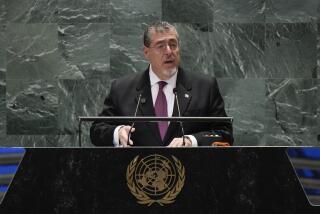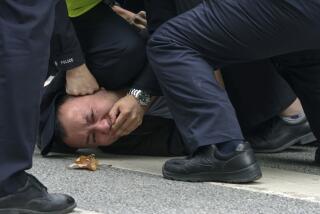Chinese Generals Promise to Bolster Paramilitary Police
BEIJING — In a sign of the government’s growing concern over unrest at home and the rise of hostile forces “surrounding China,” two senior generals pledged Thursday to boost the combat effectiveness of the nation’s 1-million-strong paramilitary police.
Since the widely condemned 1989 Tiananmen Square crackdown that saw soldiers shoot at unarmed civilians, China’s Communist Party has taken aggressive steps to beef up the People’s Armed Police, or PAP.
Analysts say Beijing has poured resources into the paramilitary force over the last 15 years, staffed it with decommissioned soldiers and officers, and boosted training, budgets and weaponry. The moves are designed to provide an alternative to the use of troops in the event that things get out of control.
The PAP should “become an extremely combat-effective force to deal with sudden incidents,” commander Wu Shuangzhan and political commissar Sui Mingtai wrote in Qiushi, or Seeking Truth, a twice-monthly publication of the party’s governing Central Committee.
Although most of Thursday’s article was devoted to the need for greater vigilance against terrorists, saboteurs and other national security threats, it also cited the police force’s need to maintain stability in the face of “large-scale mass incidents,” a reference to the growing problem of civil unrest.
China had 74,000 protests, riots and related disturbances in 2004 compared with 58,000 in 2003, according to government figures.
The article also took a swipe at “Western hostile forces,” who it claims aim to spread their values to splinter the country.
Even as China embraces many aspects of globalization, it retains a deep-seated suspicion of foreign influence that dates to the humiliating 19th century Opium Wars, which resulted in the British forcing the Chinese to open their markets and legalize opium imports.
Officials have suggested in recent months that charities and other civic groups supported by foreigners are trying to foster democracy to undermine Communist Party control.
“Western hostile forces have never abandoned political plots to Westernize and divide our country,” the generals said in their article.
In a November conference call, the Ministry of Public Security identified several threats to national stability that are underscored in the article, Chinese academics said.
Among these was growing anger and angst among Chinese as social pressure ratchets up; clashes among domestic groups over such issues as corruption, land seizures and the growing gap between rich and poor; and conflicts involving groups Beijing identifies as enemies on its periphery.
The list of foes includes those who advocate independence for Tibet, Taiwan and the far-western region of Xinjiang, as well as members of the Falun Gong spiritual movement and Tiananmen protesters who fled overseas.
Analysts say it has become increasingly difficult for local police to handle the number of conflicts by themselves, leading to calls for a stronger paramilitary force.
In December, unidentified police units fired on and killed at least three residents of Dongzhou village in Guangdong province. The villagers were protesting the seizure of their land without ample compensation for use in building a power plant.
Even basic facts about the PAP are confidential, although Western analysts estimate its forces at more than 1.2 million, up from 600,000 in 1991.
“Compared to normal police, the paramilitary police are designed to safeguard social stability through the use of compelling force if necessary,” said He Husheng, a professor of Communist Party history at Beijing’s People’s University. “We learned from Tiananmen what happened when we used the army, which was not proper. If something similar happened today, we could use the paramilitary.”
Although the number of so-called mass incidents is rising sharply -- sevenfold over the last decade by some scholars’ estimates -- Chinese analysts said they doubted these conflicts would lead to a political crisis.
“Most of the unrest is caused by a mishandling of the people’s interests, but the demonstrators don’t want to overthrow the government,” said Wang Yukai, a professor with the National School of Administration in Beijing.
Wang added that, rather than using paramilitary force on citizens, the government was addressing many causes of dissatisfaction by paring rural taxes, channeling more help to the disadvantaged and boosting medical services in the countryside.
But others say Beijing hasn’t gone nearly far enough.
“Instead of dealing with the root causes, they’re strengthening their combat effectiveness,” said Sharon Hom, New York-based executive director of Human Rights in China. “This is absolutely alarming for both human rights and rule of law.”
Rather than strengthen the courts and the media’s watchdog power, create checks and balances and reform private property rules to stem land grabs by corrupt local officials, some analysts say, the leadership has offered empty slogans about social harmony and individual virtue as a solution to China’s growing social ills.
In their article, the generals also warned security forces to remain faithful solely to the Communist Party.
Murray Scot Tanner, China specialist with the Rand Corp., said Beijing might fear that paramilitary units were becoming more sympathetic to demonstrators, undercutting their ability to follow orders unquestionably.
Ding Li in The Times’ Beijing Bureau contributed to this report.
More to Read
Sign up for Essential California
The most important California stories and recommendations in your inbox every morning.
You may occasionally receive promotional content from the Los Angeles Times.










